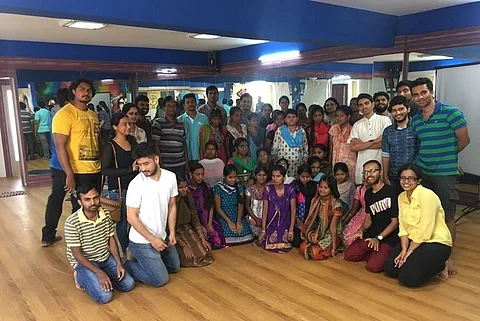

On a sunny Sunday morning, close to 50 people are gathered at ClefChord hobby center in JP Nagar, Bengaluru. They sit on the floor in about five groups, each containing an odd assortment of about seven people, watching “Finding Dory”- an animation film about the adventures of the adorable and forgetful blue tang, who is on a mission to find her family.
The groups burst into conversation in between, but everyone seems to be enjoying themselves with Dory, the cautious clownfish, Marlin and his son, Nemo.
There is one catch though: 26 of those gathered are visually impaired. How would they watch the film then?
This is the question that EnAble India, an NGO working for persons with disability, set out to answer with its event “Movie360”. With the help of 20 volunteers, the idea was to bust the myth that audio-visual media cannot be experienced by persons, with disabilities like vision impairment. And the 26 visually impaired students from Deepa Academy for the visually impaired (including those who suffered from low vision impairment as well as complete loss of vision), from classes 9 to 12, had no complaints.
The music, sound and dialogues of the film were accompanied by descriptions of the volunteers, who sat with the students and described what they saw on screen whenever required. An octopus for instance became a camouflaging squishy creature with eight tentacles. Dory’s dejection when she doesn’t find her parents the first time, finds expression in the low, melancholy voice of the volunteer who tells the students how Dory is feeling.
Vishnu Soman, a member of EnAble India and the organizer of the event, said that the film was chosen deliberately, for it shows how there is a solution to every limitation. “Dory forgets everything after a point, which is also a kind of disability. Yet, she never fails to find a solution. We want these children to experience that,” he says.
Sania Rao, a volunteer with EnAble India, said that the idea was to make the audio-visual medium accessible to all, regardless of the physical disability or the lack of it. “Experiencing a film is not limited to to the ability to see it. It is something people are passionate about. Here, we wanted to bring together film enthusiasts, break stereotypes as well as sensitize them,” she said.
The volunteers were trained by Vishnu before the screening and they were taught to not keep a constant commentary going. They were to let the students experience the film through sound and only use descriptions along with voice modulation, when it was lacking.
Jayalaxmi, a 22-year-old who has not been able to see since birth, is a student of History, a Shah rukh Khan fan and has always been passionate about music. “I love singing too. I’m one of the best in my batch!” she claims with pride. She adds that Shreya Ghoshal and Sonu Nigam are her favourite singers. Usually, it is her sister who sits with her and tells her who is talking or singing on screen.
Dipashree, a class 8 student who suffers from low vision impairment, said she loves watching horror films and usually does not take assistance. “Telugu film “Arundhati” is my favourite! I’ve watched it 15 times,” she says cheerfully.
(Edited by Geetika Mantri)